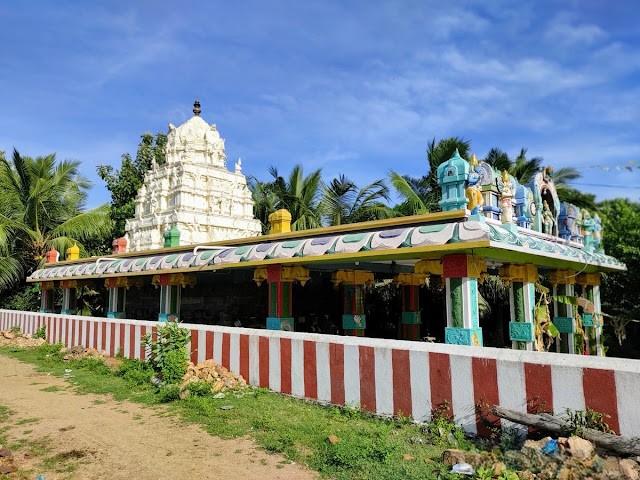According to Hindu legend, sage Garga performed intense penance at the Sri Karunakara Perumal Temple and gained profound knowledge. As a result, the place was originally named Garagaham. Over time, this name evolved into Kaaragam.
Sthalapuranam:
In this sacred place, the deity is Karunakara Perumal, who faces the South, symbolising the direction of the cool breeze. Along with Padmamani Naachiyaar, he embodies the Megham (clouds) that bring rain to nourish the world’s wealth.
Karunakara Perumal, like the clouds, bestows blessings selflessly, expecting nothing in return but pure devotion from his devotees. The name "Karunakara" reflects his nature of compassion and his focus on receiving only sincere devotion.
Just as the sky may withhold rain to test the earth before finally nurturing it, Karunakara Perumal may test his devotees’ steadfastness in devotion. Ultimately, he blesses them, helping them overcome their challenges and thrive.
Legends:
Water, or "Neer," is essential for the survival of all living things. This concept is reflected in the deity Karunakara Perumal, who embodies the nature of water. Just as water naturally flows to fill any gaps, Karunakara Perumal enters the hearts of his devotees, filling their spirits with devotion.
Water is cool and provides refreshing blessings, much like how the deity bestows his grace. Every living being requires water, and it also purifies the body, symbolising the purification and spiritual elevation needed to achieve Moksha.
Even a small crack in a vessel allows water to seep through, similarly, even a small
the amount of devotion in the hearts of his devotees will attract his grace. Conversely, if we neglect to think of or pray to him, his presence may recede like water escaping through a crack. Water levels out the terrain, flowing to all areas regardless of elevation, symbolising that in the presence of Sriman Narayanan, all beings are equal, and no one is higher or lower than another.
Info on the Deity – Specific to the Temple Deity :
The primary deity (Moolavar) of this temple is Sri Karunakara Perumal. He is depicted standing and facing the South, a direction associated with the cool breeze. Alongside him is Padmamani Naachiyaar, also known as Ramamani Thayar.
Sri Karunakara Perumal is revered as the embodiment of Megham (clouds), symbolising the rain that nourishes and enriches the world. His name, "Karunakara," reflects his nature of compassion and grace. The temple is also honoured in the verses of Tirumangai Alvar, highlighting its spiritual significance.
Significance :
Thiru Kaaragam - Sri Karunakara Perumal Temple is located in Kanchipuram, Tamil Nadu, the Sri Karunakara Perumal Temple is dedicated to Lord Vishnu and is one of the 108 Divya Desams.
In this sacred temple, the deity is Karunakara Perumal, who stands facing the South, a direction associated with the cool breeze. He is accompanied by Padmamani Naachiyaar.
Karunakara Perumal symbolises the Megham (clouds) that bring rain to enrich the world. Like clouds, he offers his blessings selflessly, expecting only pure devotion from his devotees. His name, "Karunakara," reflects his compassionate nature.
Just as the sky may withhold rain to test the earth before ultimately nurturing it, Karunakara Perumal may test his devotees' steadfastness in their devotion. Ultimately, he blesses them, helping them overcome challenges and flourish.
